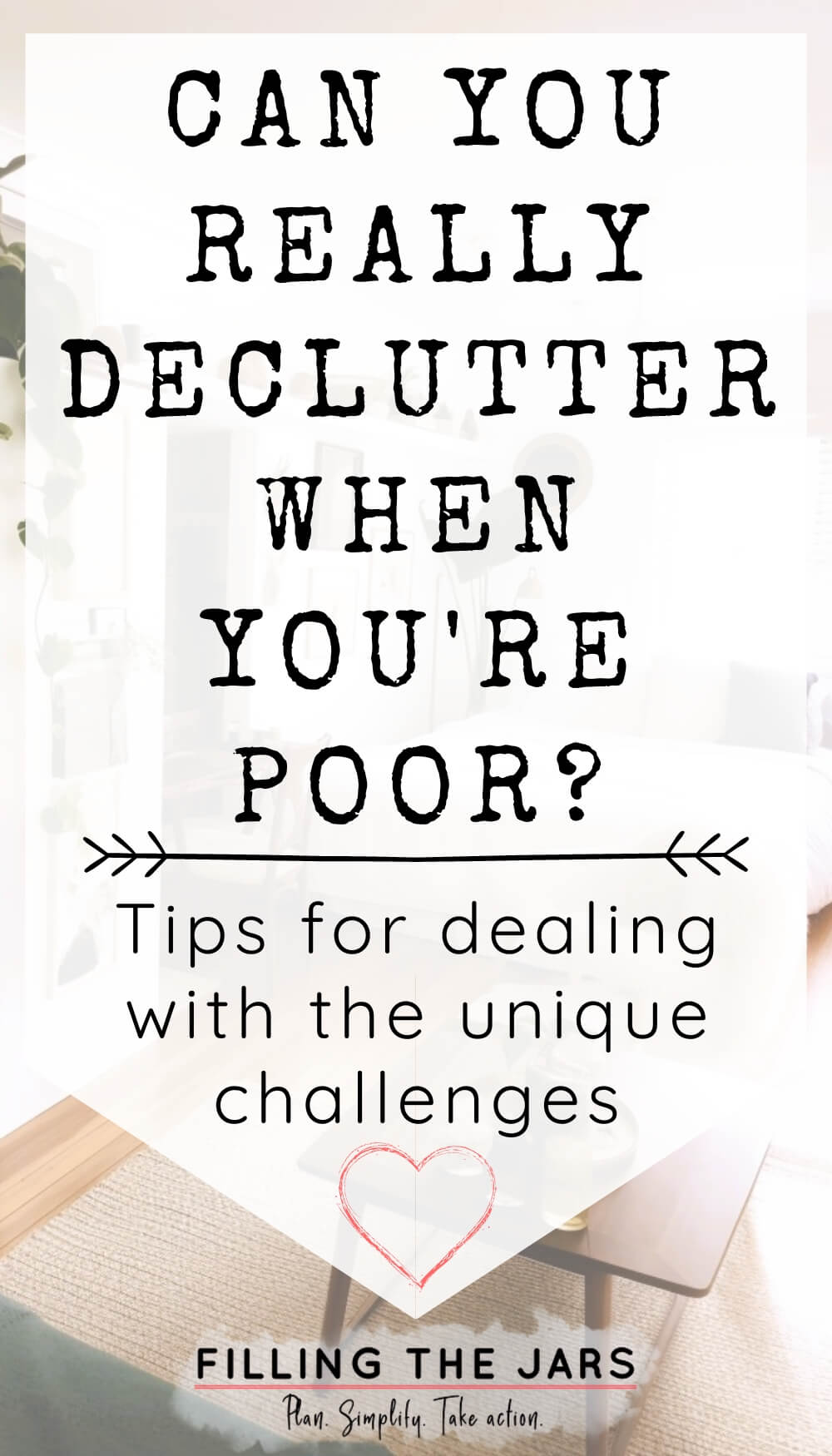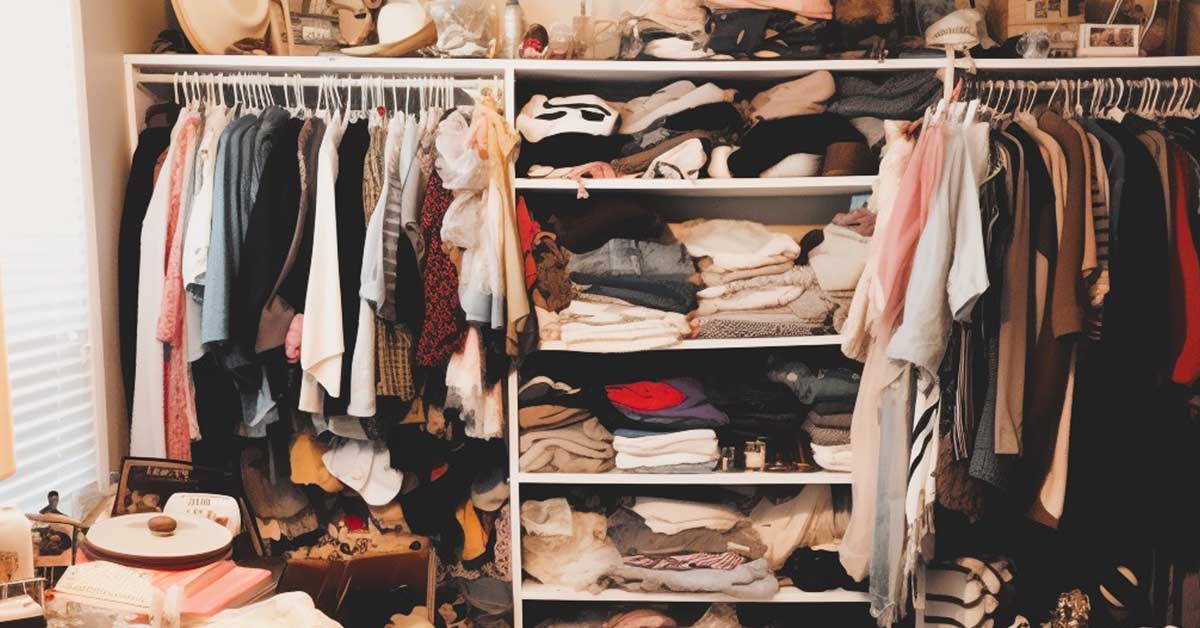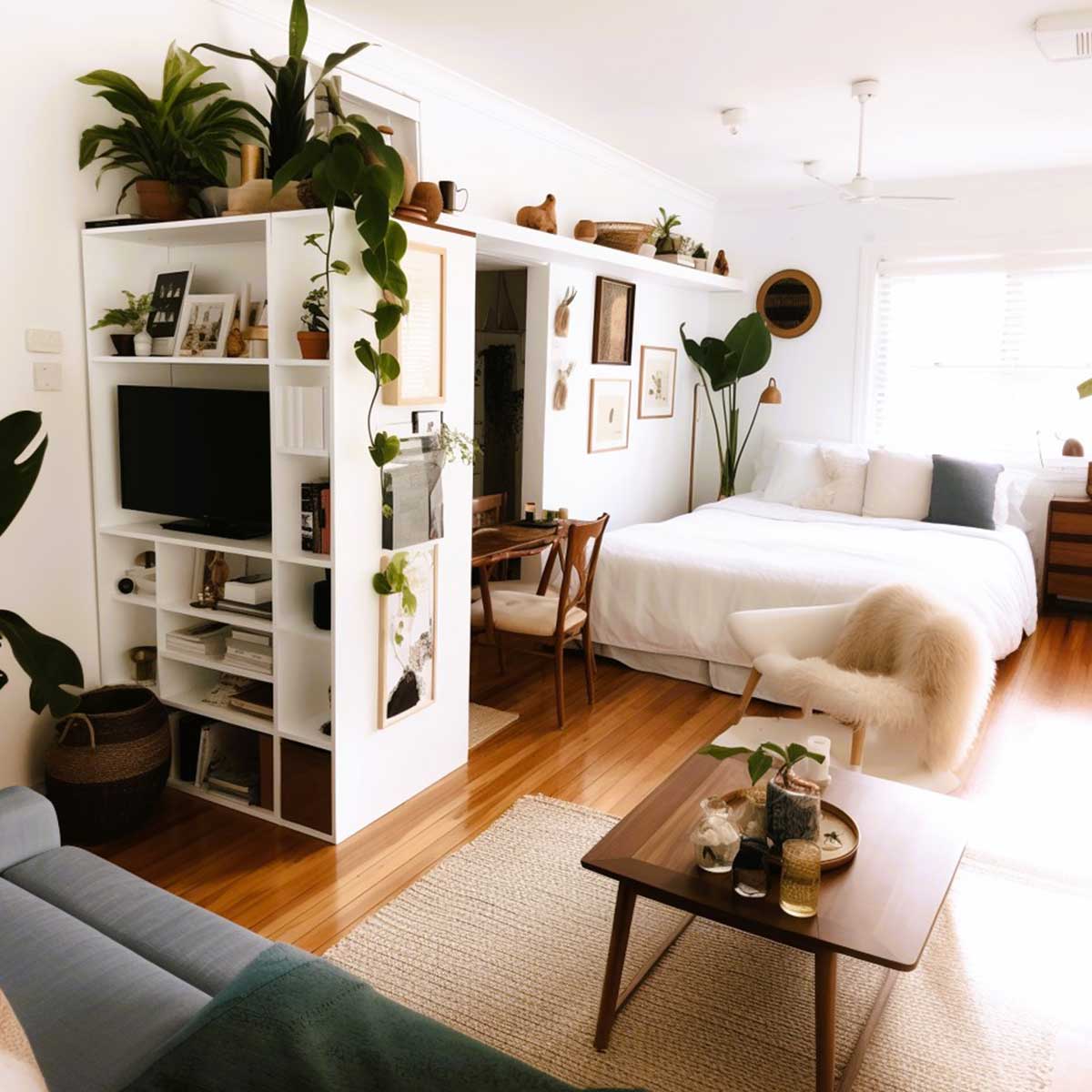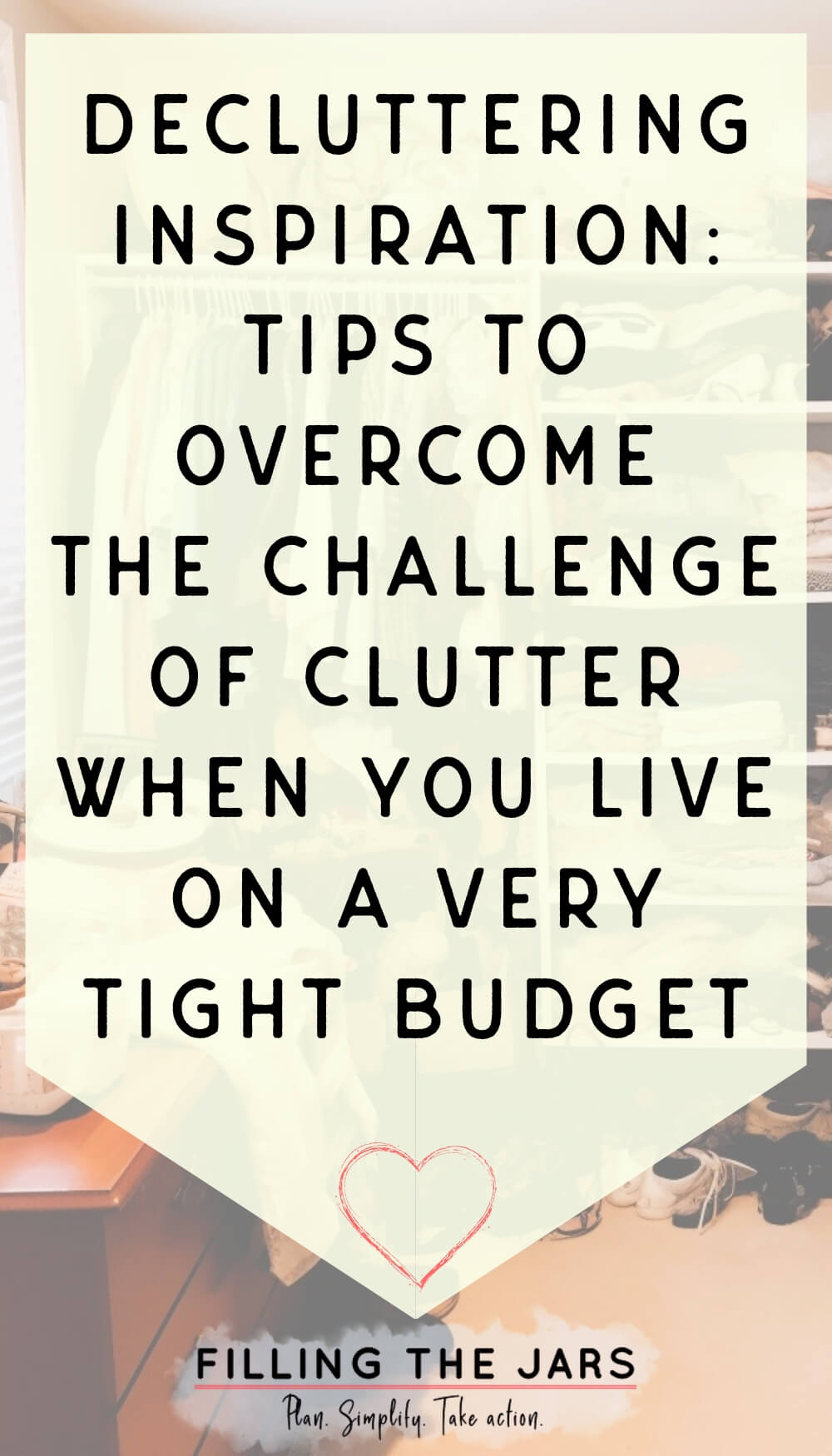A cluttered home can be overwhelming and stressful, especially when you’re already dealing with financial difficulties. Let’s talk about the unique challenges of decluttering when you’re poor and some specific declutter tips and strategies you can use to get started TODAY.

This post may contain affiliate links. If you choose to purchase through an affiliate link, I may receive a small commission at no additional cost to you. You can see my full disclaimer here.
Why Decluttering Is Important Even If Finances Are Tight
If you’re struggling to make ends meet, the idea of decluttering your home might seem like a luxury you can’t afford. You would love to clear out the excess, but the thought of letting anything go feels wasteful and fiscally irresponsible. (After all, you don’t have the money to replace items if you need them later!)
It’s important to remember that decluttering can have a significant impact on your life, even if you’re on a tight budget.
When you have too much stuff, it can be difficult to find what you need, and you may feel like your living spaces are cramped and maybe even dirty. By decluttering, you can create more space in your home, make it easier to find the things you need, and make it much easier and faster to clean.
Decluttering can also help reduce stress. When you have too much stuff — especially visual clutter — it can be overwhelming. By letting go of things you TRULY don’t need or use, you can reduce the amount of stress in your life and create a more peaceful living environment.
By decluttering, you can improve your ability to process information and make decisions, leading to increased productivity and efficiency.
You might be thinking, ‘That sounds great, but it’s not realistic for me. You just don’t understand my situation. I have no money, and that changes everything. I simply CAN’T get rid of things.’
I really do get it! I’ve spent many years of my life stretching dollars and squeezing pennies, and I’ve learned a few things along the way.
Here are my thoughts about decluttering when you’re poor. Please take what you can use, and simply leave what doesn’t work for you. I only ask that if you’re feeling overwhelmed by your current clutter situation, please give yourself a chance to overcome it!

4 Unique Challenges Of Decluttering When You’re Poor
Decluttering can feel like an overwhelming project. And when you are on a tight budget, it seems even MORE difficult.
Here are some of the challenges you might face:
- Poverty mentality (aka scarcity mindset)
- Extreme guilt (along with sometimes feeling like a dumping ground)
- Living in a very small space
- Self-doubt or low self-esteem
Whether or not you have money, many people fall into the trap of accumulating things they don’t need.
But when you’re truly broke, you tend to accept anything people give you, no matter what condition it’s in or whether or not you have a use for it. You start to collect anything you can get for free. You hold onto items because you think you might need them someday, or because you feel guilty getting rid of something that was a gift.
You might think that getting rid of things is a waste of money. But the truth is, living in a cluttered collection of free stuff can actually be a sign of a poverty mentality. Decluttering can be a crucial step in breaking out of that cycle.
What if clearing clutter could actually help you make positive changes that support your life goals? What if letting go of things that no longer serve you could open up space for abundance and new opportunities?
I know… it might sound a little woo, but I have a very specific reason for saying that.
1. Understanding Poverty Mentality and Scarcity Mindset
When money is a struggle all.the.time, we tend to fall into the trap of poverty mentality and scarcity mindset. Part of this is where you feel like you don’t have enough to let anything go.
One of the key aspects of poverty mentality is the belief that you’ll NEVER have enough, that you’re ALWAYS going to be struggling. This can sometimes lead to hoarding behavior, where you hold onto things because you’re afraid you won’t be able to afford to replace them… even if you actually have no use for them.
Scarcity mindset is similar, but it’s more about feeling like there might not be enough to go around, that you have to hold onto everything ‘just in case.’
To overcome these mindsets, you need to start by acknowledging them. Recognize when you’re thinking in terms of scarcity or poverty, and challenge those thoughts. Ask yourself if they’re really true, or if they’re just beliefs that you’ve internalized.
Once you’ve acknowledged these mindsets, you can start to develop strategies for overcoming them.
Letting Go of Poverty Mentality and Scarcity Mindset
Not gonna lie, this is REALLY tough. It involves a lot of thought work to shift your beliefs and find balance in this area when it comes to your stuff.
One approach is to focus on gratitude and abundance, rather than scarcity. Instead of thinking about what you don’t have, focus on what you do have — how you can make the most of it, and how you can become more generous by sharing with others.
When it comes to actually decluttering, there are a few key principles to keep in mind.
- Be honest with yourself about what you actually use and value, and gradually let go of the rest. This does NOT have to happen in one weekend.
- Consider alternative ways of getting rid of things. You don’t necessarily have to throw everything away. You can sell items online or at a garage sale, donate them to a local charity, or give them away to friends or family members who could use them. (More on this later…)
Simply keeping a lot of ‘stuff’ is not actually improving your financial situation. Remember, this clutter can actually make it harder to focus on your goals and make progress toward financial stability.
By decluttering your home of the things you don’t actually NEED, you begin to create a space that feels more peaceful and organized, which can help you feel more in control of your life. In turn, you’re more likely to take action on doing things that will create abundance and eliminate scarcity.
2. Dealing With Guilt
This can be a tough one, especially if you secretly feel like you’re the dumping ground for other people’s unwanted items. You might feel guilty about getting rid of things that were given to you, even if you don’t actually want or need them.
Remember, though — you are NOT responsible for other people’s clutter. You have the right to decide what stays and what goes in your own space. If you feel bad about getting rid of something, try to reframe it as giving someone else the opportunity to use and appreciate it.
You may also feel guilty about getting rid of inherited or sentimental items. But it’s important to remember that memories and emotions are not tied to physical objects. You can still cherish those memories without holding onto the physical item. Additionally, you can donate or pass on items to someone who will appreciate and use them.
3. Living In A Small Space
When you’re on a tight budget, you’re more likely to live in a smaller space, which can make storing things for future use really challenging. When you don’t have a lot of room, clutter can quickly take over and make your space feel even smaller.
Limited storage space means that you have to be even more intentional about what you keep and what you let go of.
To tackle this challenge, start by setting some boundaries for yourself. Decide how much space you’re willing to devote to different categories of items (clothing, books, etc.) and stick to those limits.
Prioritize the true value and cost to replace the items you want to store. Not everything is worth the space it holds.
And remember, just because you have a small space doesn’t mean you have to live with clutter. A little bit of decluttering can go a long way in making a small space feel more open, larger, and inviting.
4. Self-Doubt
Being broke can lead to feelings of self-doubt and low self-esteem. You may feel like you don’t deserve to have a clutter-free home, or that you don’t have the skills to declutter effectively. These negative thoughts can make it challenging to get started and follow through with the process.
To overcome this, try to focus on the positive aspects of decluttering. You CAN learn these decluttering decision-making skills. Think about how good it will feel to have a more organized and spacious living environment. And remember, you are worthy of having a home that feels comfortable and welcoming.

5 Decluttering Tips That Work Even When You’re Broke
So how can you declutter when you’re broke? There are actually some really great strategies you can use. Let’s explore some specific tips for decluttering — even when you’re on a tight budget.
1. Identify Priorities and Goals
Before you start decluttering, take time to identify your priorities and goals. What do you hope to achieve by decluttering your space?
This could include creating more living space, making some extra money by selling unused items, clearing visual clutter for a more peaceful environment, or starting fresh with a clean and organized space.
Another goal might be decluttering and creating a comprehensive inventory list so that you can better utilize your storage options and make items more accessible for future use.
Having clear goals in mind will help you stay focused and motivated throughout the process.
2. Pre-make Some Decisions
To make the decluttering process smoother, set some guidelines for yourself.
- Establish a value threshold for items you’ll keep, donate, or sell.
- Decide on the best method for selling your items, such as online platforms, garage sales, or consignment shops.
- Set a time limit for selling items, and if they don’t sell within that time frame, donate them.
- Develop standard replies to politely decline incoming clutter, while still being open to accept the things you genuinely need.
- Determine a reasonable limit for keeping items ‘just in case’, such as clothes, books, or kitchenware.
3. Ease Into Decluttering
Instead of trying to tackle your entire home at once, break the decluttering process into manageable 10-minute daily sessions. (Grab my free printable quick-start mini declutter plan to help track your progress!) I’ve found it really is the best way to begin decluttering when you’re unsure about the process.
Every day, you’ll learn to make faster and better decisions, but at first it will help you avoid feeling overwhelmed. By consistently dedicating a small amount of time to decluttering each day, you’ll gradually create a more organized space without feeling burdened by the task.
Related: The Slow Declutter: A No-Mess Method to Declutter Your Home
4. Organize and Protect the Things You Decide to Keep
Life happens. You already know that stockpiling free or super-cheap things can be a great way to stretch a very limited budget. Even after you’ve decluttered, you may decide to hold onto a few extras of things like clothes, etc.
And I get that… but also caution you to consider what it will take to organize and protect those items until you ‘maybe’ use them at some future date.
If you can’t properly store things to keep them undamaged — or remember what you’ve got when you need it — then it’s better to pass on the ‘opportunity’ to acquire all.the.things.
It’s a tough lesson to experience… I’ve been there and don’t want you to have to go through the same sense of frustration. I’ve learned that storing and keeping track of LESS stuff means you can do a better job of protecting and using what you DO keep.
5. Check In With Yourself Often
During the decluttering process, remind yourself that you’ve managed to accumulate these items at little to no cost. This means it’s likely you’ll come across similar deals and freebies in the future. (Read that again — it’s VERY important to remember.)
By letting go of items you no longer need, you’re making room for new opportunities and experiences.
More Help To Declutter And Organize
7 Ways to Get Motivated to Clean and Declutter
Do These 3 Things When You’re Overwhelmed By Clutter
Easy Closet Organization Ideas On A Budget To Transform Your Mess
3 Powerful Ways To Break The Clutter Cycle For Good
Final Reminders…
I hope all of the things we’ve just discussed have helped you to understand and truly believe that you absolutely CAN declutter when you live on a really tight budget!
Decluttering is not about perfection or minimalism. It’s about creating a home and a life that reflects your values and your vision.
It’s also important to remember that becoming clutter-free is an ongoing process. It’s not something you do once and then forget about. You’ll need to continue to be mindful of what you bring into your home, and regularly assess what you have and what you need.
Finally, remember that decluttering isn’t just about physical possessions. It’s also about letting go of limiting beliefs and negative thought patterns. You start to see yourself as someone who is capable of creating a life of abundance and prosperity, regardless of your current financial situation.
You may start to take small steps towards your goals, like creating a budget or starting a side hustle. When these changes happen, you’ll realize that every action you take toward your dreams is a step in the right direction.
You’ve got this!
Did you enjoy this post? Know someone else who might like it? Please take a moment to share on Pinterest, Facebook, or your favorite social media… (Click the sharing buttons at the bottom of the post.) Thank you!


